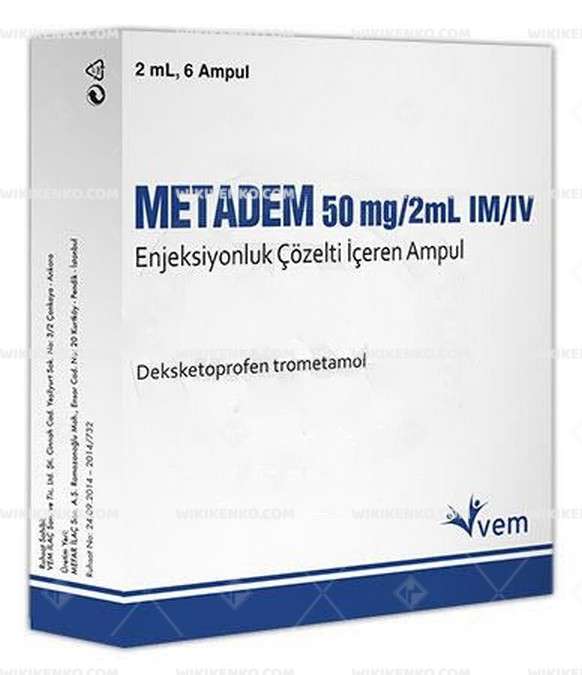Metadem Im/Iv Injection Solution Iceren Ampul
Dexketoprofen Trometamol, a nonsteroidal anti-inflammatory drug (NSAID), is a pharmaceutical agent employed in the management of pain and inflammation. Available in various forms, this article delves into its composition, dosage, side effects, and mechanisms of action, delivering a comprehensive understanding of its therapeutic potential.
| Dosage form | |
|---|---|
| Pack size | |
| Potency | 50 Mg/2Ml 6X2Ml |
| Manufacturer | |
| Origin | |
| Generic Name (Ingredient) | Each 2 Ml Ampoule Contains 73.8 Mg Dexketoprofen Trometamol Equivalent To 50 Mg Dexketoprofen. |
Assuming your emergency circumstances for this product, visit Urgent Quotation page. Besides, for any pharmaceutical questions, please ask us in the comments section.
Description
Notice: Please be advised that this webpage contains information relating to the ingredient Dexketoprofen Trometamol, used in Metadem Im/Iv Injection, despite the relatively limited available resources on the subject matter.
Dexketoprofen Trometamol
Dexketoprofen Trometamol exists in oral, intramuscular, and intravenous forms. Each 2 mL ampoule of this medication encompasses 73.8 mg of Dexketoprofen Trometamol, equivalent to 50 mg of Dexketoprofen.
Side Effects
As with any pharmaceutical intervention, Dexketoprofen Trometamol is not devoid of side effects. While its primary purpose is to alleviate pain and inflammation, it’s crucial to be cognizant of the potential drawbacks. Common side effects may include vomiting, nausea, injection site pain, and injection site reactions such as pain, swelling, and redness. Additional side effects encompass heartburn, diarrhea, indigestion, and abdominal pain.
In rare instances, more severe side effects might manifest, including gastrointestinal bleeding, peptic ulcers, jaundice, hepatitis, rash, thrombocytopaenia, visual disturbances, tinnitus, depression, fatigue, headache, dizziness, and vertigo. If you encounter any side effects while undergoing treatment with Dexketoprofen Trometamol, promptly consult your healthcare provider for guidance.
Dosage
Determining the correct dosage of Dexketoprofen Trometamol hinges on the specific medical condition, age, and other pertinent factors. For tablets, the typical dose entails either half a 25 mg tablet every 4-6 hours or one 25 mg tablet every eight hours. In the case of the injectable form, the recommended adult dose stands at 50 mg every 8-12 hours, with the option of repetition at intervals of 6 hours if necessary.
However, it’s imperative to underline that the total daily dose should not exceed 150 mg. To ensure precision in your Dexketoprofen Trometamol regimen, consult your healthcare provider, who will tailor the dosage to your unique circumstances.
Mechanism: How Dexketoprofen Trometamol Operates
Dexketoprofen Trometamol, classified as a nonsteroidal anti-inflammatory drug (NSAID), functions by curbing the activity of hormones responsible for inflammation and pain within the body. This medication’s purview extends to addressing mild to moderate pain, inflammation, and fever. Its mode of action revolves around the inhibition of the enzyme cyclooxygenase (COX), an active participant in the production of prostaglandins.
Prostaglandins are chemical agents that promote inflammation, pain, and fever. By obstructing prostaglandin production, Dexketoprofen Trometamol effectively mitigates these distressing symptoms.
The NSAID Landscape
Nonsteroidal anti-inflammatory drugs (NSAIDs) constitute a formidable class of pharmaceuticals widely employed to mitigate pain, inflammation, and fever. Their modus operandi involves the blockade of prostaglandin production, the very agents responsible for fomenting inflammation, pain, and fever in the human body. Commonplace examples of NSAIDs encompass aspirin, ibuprofen, and naproxen, available both over-the-counter and via prescription.
These medications offer diverse administration routes, be it oral ingestion or topical application. NSAIDs prove invaluable in addressing conditions spanning headaches, menstrual cramps, arthritis, and muscle aches.
Conclusion
In conclusion, Dexketoprofen Trometamol, an NSAID, stands as a potent pharmaceutical asset for tackling pain and inflammation. Its composition, dosage, and mechanisms of action converge to create a comprehensive portrait of its utility.
However, due to its potential side effects, precise dosage adjustments, and complex interactions, the vigilant guidance of a healthcare provider remains paramount. Dexketoprofen Trometamol takes its place within the broader NSAID domain, a testament to medical science’s ongoing commitment to alleviating human suffering.
Use the form below to report an error
Please answer the questions as thoroughly and accurately as possible. Your answers will help us better understand what kind of mistakes happen, why and where they happen, and in the end the purpose is to build a better archive to guide researchers and professionals around the world.
The information on this page is not intended to be a substitute for professional medical advice, diagnosis, or treatment. always seek the advice for your physician or another qualified health provider with any questions you may have regarding a medical condition. Always remember to
- Ask your own doctor for medical advice.
- Names, brands, and dosage may differ between countries.
- When not feeling well, or experiencing side effects always contact your own doctor.
Cyberchondria
The truth is that when we’re sick, or worried about getting sick, the internet won’t help.
According to Wikipedia, cyberchondria is a mental disorder consisting in the desire to independently make a diagnosis based on the symptoms of diseases described on Internet sites.
Why you can't look for symptoms on the Internet
If diagnoses could be made simply from a textbook or an article on a website, we would all be doctors and treat ourselves. Nothing can replace the experience and knowledge of specially trained people. As in any field, in medicine there are unscrupulous specialists, differences of opinion, inaccurate diagnoses and incorrect test results.



Reviews
There are no reviews yet.